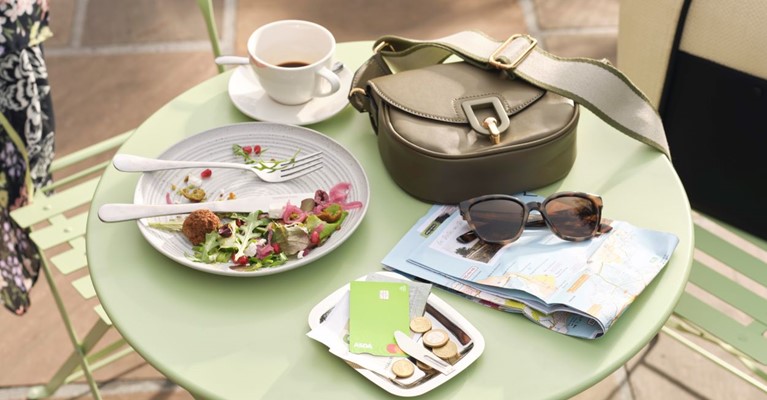Cheap Travel insurance Europe
Getting the right cover for a holiday in Europe
- Single trip quotes starting from £7.21*
- Annual multi-trip and single-trip policies available
- Up to three kids go free
- 4X Gold Moneynet Award for Best Travel Insurance Provider

Heading on a European adventure? Make sure you're fully protected with Europe travel insurance from Asda Money.
Do I need travel insurance for Europe?
As with any holiday, things can go wrong, from lost baggage to cancelled flights or stolen valuables. Getting travel insurance can help to cover any unexpected costs or problems that may occur during your trip to Europe.
Ensure peace of mind on your trip - get a quote for Europe travel insurance today.
Our Levels of Europe travel insurance
-
Get value cover
Value
• Medical expenses up to £20m
• Missing bags up to £1,000
• Personal Money £300
• Cancellation £1,000 -
Get premium cover
Premium
• Medical expenses up to £25m
• Missing bags up to £1,300
• Personal Money £400
• Cancellation £2,000 -
Get superior cover
Superior
• Medical expenses - unlimited cover
• Missing bags up to £2000
• Personal Money £500
• Cancellation £5,000
Why choose Asda Travel Insurance?
Provided by InsureandGo
-
![Asda logo]()
The Asda advantage
Known for putting value for money at the centre of everything we do
-
![InsureandGo logo]()
Partner expertise
With over 20 years experience, InsureandGo brands have covered over 27 million travellers
-
![]()
Award-winning cover
Awarded Triple Gold for Best Travel Insurance Provider in the Moneynet.co.uk awards 2022, 2023, 2024 and 2025.
Our Product Benefits
-
![Teddy bear icon]()
Kids go free
Up to three kids go free when you buy direct
-
![Medical Icon]()
Medical conditions
All pre-existing medical conditions considered
-
![Luggage Icon]()
Baggage cover
Baggage cover up to £2,000
-
![Thumbs up icon]()
COVID-19 cover
Cover for medical costs and cancellations relating to coronavirus
Do I still need travel insurance with an EHIC card?
A European Health Insurance Card (EHIC) covers you for emergency medical care in the local health service of the EU country you’re visiting (not private hospitals). It means emergency care will be provided to you at a reduced cost or free, depending on which EU country you’re in.
For UK travellers, EHIC cards issued before the end of 2020 will be valid until their expiry date (on the front of your card). The EHIC was replaced by the GHIC (Global Health Insurance Card) in 2021. Visit the gov.uk website for the most up-to-date information on the EHIC and GHIC.
It’s important to be aware that EHIC and GHIC are not a replacement for European travel insurance. These cards may not be valid in every EU country, and there are restrictions on what it can be used for.
Europe travel insurance provides comprehensive medical cover for any unexpected bills, as well as providing cover for things like lost belongings and travel disruption.
To ensure you're fully protected during your travels, get a travel insurance quote today.
Which European countries are covered by travel insurance?
The countries covered by your travel insurance depends on your provider. You should always check your policy covers your destination even if you’re only travelling within Europe or travelling to destinations nearby.
Our Asda Travel Insurance policies cover all the countries of Europe as well as a few adjacent destinations such as Egypt and Morocco. See below the full list of countries our European Travel Insurance covers:
- Eastern Europe
-
- Albania
- Armenia
- Austria
- Azerbaijan
- Belarus
- Bosnia And Herzegovina
- Bulgaria
- Croatia
- Czech Republic
- Estonia
- Georgia
- Hungary
- Latvia
- Lithuania
- Macedonia
- Moldova
- Montenegro
- Romania
- Russia
- Serbia
- Slovakia
- Slovenia
- Spain
- Turkey
- Ukraine
- Western Europe
-
- Andorra
- Balearics
- Belgium
- Canary Islands
- Cyprus
- Denmark
- Faroe Islands
- Finland
- France
- Germany
- Gibraltar
- Greece
- Iceland
- Ireland
- Italy
- Liechtenstein
- Luxembourg
- Madeira
- Malta
- Monaco
- Morocco
- Netherlands
- Norway
- Poland
- Portugal
- San Marino
- Spain
- Sweden
- Switzerland
- Africa & Middle East
-
- Egypt
- Israel
- Morocco
- Tunisia
Make sure you review your policy documents to ensure you’re covered to travel to your chosen destination. And if you’re travelling further afield, consider worldwide travel insurance or country-specific options like travel insurance for the USA.
If you’re unsure about the level of cover you have, get in touch with our customer service team to clarify the terms of your policy.
Do I need a visa to travel to Europe?
If you’re travelling as a tourist, UK passport holders can visit the EU visa-free and stay for up to 90 days in any 180-day period.
At the border, you may need to show an onward ticket and demonstrate that you have enough money for your stay.
You should always check the latest advice before you travel - visit gov.uk for the most up-to-date information on travelling in the EU.
H3: Do UK citizens need a visa for Spain?
No, UK citizens don’t need a visa for Spain. As Spain is in the EU, you can visit Spain visa-free for 90 days in any 180-day period.
What is ETIAS and how does it affect UK travellers?
ETIAS stands for European Travel Information and Authorisation System. It’s a travel authorisation that is set to become mandatory from May 2025 for travellers entering Schengen Area countries. Travellers from over 60 countries worldwide will need one, including the UK, USA and Canada.
It’s a simple process to apply, and you’ll need to fill out an online form and pay a €7 fee. It’s effectively an added layer of security, with each traveller’s details compared against security databases like Interpol.
How much is travel insurance to Europe?
With Asda Money, quotes for single-trip travel insurance to Europe start from £7.21*
However, how much you pay for travel insurance to Europe will also depend on other factors, such as:
- Any pre-existing medical conditions you have
- Whether you need any extras like winter sports cover
- The type of policy, either single trip or annual multi-trip travel insurance
- The level of cover you need, Value, Premium or Superior
Compare quotes and find affordable travel insurance for your Europe trip today.
*price accurate as of 5th March 2025, based on a single trip to France, value level cover, for one adult aged 30, for 5 days, no medical conditions.
Frequently asked questions
- Is Bulgaria included in Europe for travel insurance?
-
Bulgaria is part of the European Union and the continent of Europe, so is typically included in any travel insurance policy that covers travel within Europe. But you should always check the policy carefully to make sure your chosen destination is covered.
Asda Money travel insurance includes Bulgaria in its European cover.
- Is Turkey included in Europe for travel insurance?
-
Some providers include Turkey within their Europe travel insurance policies, while others include it within their worldwide cover. So, it’s important to check with type of policy Turkey falls in with your chosen provider.
Asda Money travel insurance includes Turkey in its European cover.
- Is Gran Canaria in Europe for travel insurance?
-
The Canary Islands are part of Spain, and so are part of Europe and the European Union. This means insurers usually include Gran Canaria and the rest of the Canary Islands in any Europe-wide policy. However, you should always check the policy carefully to make sure your chosen destination is covered.
If you’re buying travel insurance with Asda Money, Turkey is included within its European cover.
ASDA Money is a trading name of Asda Financial Services Ltd and Asda Stores Ltd which for travel insurance are Introducer Appointed Representatives of Insure & Go Insurance Services Ltd. Asda Travel Insurance is arranged by IES Limited, which is registered in Gibraltar company number 117274. Registered Office: 1st Floor, Portland House, Glacis Road, Gibraltar, GX11 1AA. IES Limited is licensed and regulated by the Gibraltar Financial Services Commission number FSC25393 and trades into the UK on a freedom of services basis, FCA FRN 824283. Asda Travel Insurance is administered by Insure & Go Insurance Services Limited. Insure & Go Insurance Services Limited is authorised and regulated by the Financial Conduct Authority, firm reference number 309572.
Our Travel Insurance policy now covers for Medical costs and Cancellation claims on policies where customers or a member of their family / travelling party are diagnosed with Coronavirus, or are personally instructed to quarantine because of Coronavirus by an NHS service or healthcare professional. All other claims relating to COVID-19 or Government restrictions on travel are excluded. If the FCDO advises against travel to your destination because of Coronavirus, we will still be able to cover you for non-Coronavirus related claims. For more details on this, please see our FAQs.
*Up to three kids go free per insured adult, subject to medical screening, when you buy direct from us.






